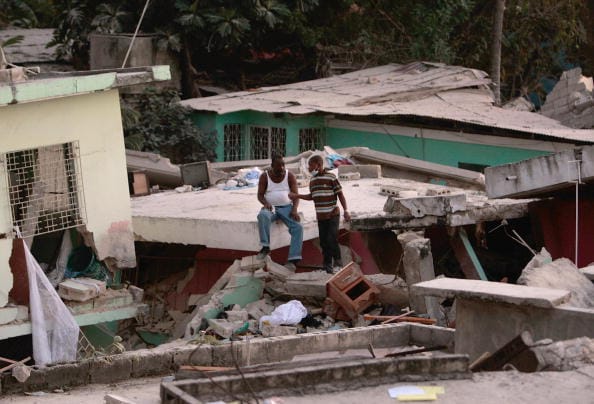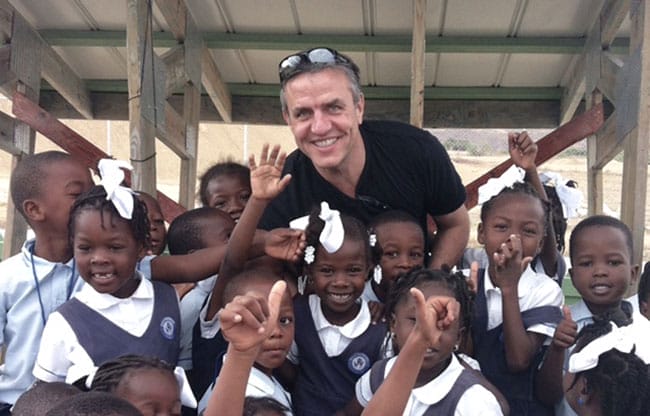The Advanced Management Program (AMP) is an immersive, five-week Wharton Executive Education program delivered in partnership with the Wharton Leadership Program. Alumni of AMP frequently describe the entire experience as transformative and life-changing. Olivier Bottrie WAM09, a senior executive at the Estée Lauder Companies Inc. who attended AMP in 2009, can attest to that—as he did when we spoke with him recently.
It was the middle of a night in 2009—at the very end of a five-week Advanced Management Program at the Wharton School’s Executive Education program—when Olivier Bottrie turned a brief nightmare into the foundation of his life’s dream.
Bottrie, a leading executive at the New York-based cosmetics giant Estée Lauder, had fallen asleep for only about a half-hour when he bolted upright in a bit of a panic at 1 a.m.—suddenly remembering one last homework assignment for the Wharton program. He was supposed to write a mock Fortune magazine profile of himself, set 15 years in the future, spelling out his accomplishments and how he’d reached his cherished goals. Barely awake, Bottrie wrote quickly.
“So I spoke of my career, of course, brilliant,” he says, “and after two-and-a-half pages of job and profession and career, I started something else.”
He wrote that in 2011, which was two years away, he would launch a foundation that would be called The Brain Train. It would attract funding from billionaire Bill Gates, open its first school in Haiti—his wife’s native country—in 2013 and be educating 150,000 students worldwide by 2025.
Six years later—spurred on by the tragedy of Haiti’s deadly 2010 earthquake—Bottrie is farther along in reality than he could possibly have imagined on that sleepless night. It was actually October 2011 when he and his philanthropic partners opened the doors to Lycée Jean-Baptiste Point du Sable, a nonprofit school in Saint Marc, Haiti, an isolated community with a high rate of poverty and few education options.
“The concept that we push away, every time it’s mentioned to us, is the concept of, ‘good enough for Haiti,’” says Bottrie, who is 53 and came to the United States from his native France 20 years ago.
Instead, Bottrie and his philanthropy, called Hand in Hand for Haiti (not The Brain Train as in his mock profile), have strived to make the school—which now has just over 300 students—on par with an elite private education in New York or Paris. The school features classes in English and French, highly trained teachers and free health care with two meals a day for its underprivileged charges.
Bottrie’s calling is a unique twist on what can emerge from Wharton’s Advanced Management Program, a highly selective, immersive, five-week program for midcareer executives seeking to amplify their management skills and tackle new challenges, both in the workplace and beyond. David Heckman, senior director of global partnerships at Wharton Executive Education, says that the social entrepreneur component is part of what makes the AMP program truly special. Working in small groups with leaders from other industries and other nations, AMP participants hone their skills in solving complex social or environmental problems, Heckman says, but also reconnect with goals trampled in the daily corporate stampede.
At its best, Heckman says, the AMP program can help executives “rediscover a lost love, like reading poetry or playing the trombone or running,” all with the goal of rediscovering a sense of mission and purpose.
Like many of his classmates, Bottrie had achieved considerable success before enrolling in the Wharton program. Bottrie, the son of a French military officer, was drawn to the United States after spending a short time here during his dad’s training in Kansas in 1960s. Bottrie returned for his MBA at George Washington University, took a job with designer Yves St. Laurent and then signed on with Estée Lauder. His career path brought him to Miami, where he met his wife, and then to New York. Today, he is president of Lauder’s travel retailing unit, which sells $1.3 billion in cosmetics at airports, duty-free shops and the like, with some 5,000 employees.
Yet he admits he’s always wanted something more. Around the start of the millennium, Bottrie confided in his then-new wife: “We discussed the possibility that I would leave all this behind, and education was mentioned.”
He credits Wharton Executive Education’s AMP program with both inspiring him again and helping him find focus. Indeed, the AMP program kicked off with a two-day session called “True North”—named for the 2007 leadership book by Bill George—aimed at helping participants find greater meaning and purpose. Bottrie still has the black book from that session in which he jotted down his mission statement:
“My purpose was to help and mentor children.”
Still, upon returning home to New York, Bottrie needed one final catalyst. That turned out to be the January 2010 earthquake in Haiti, which claimed well over 200,000 lives. In the first 24 hours after the catastrophe, Bottrie and his wife worried about her parents—who turned out to be OK—and other friends and family.

An image of survivors and the rubble in Port au Prince, Haiti, days after the January 12, 2010, earthquake. Photo credit: Chris Hondros/Getty Images.
“I was very concerned, watching on TV, and so I said, ‘We need to do something … by the way, I have a project,” he recalls.
Within days, Bottrie received backing from Estée Lauder’s charitable committee; enlisted two well-connected allies in Ed Brennan, the CEO of retailer DFS, and industry publisher Martin Moodie; and created a nonprofit that has raised $15 million, much of it from travel-retailing contacts.
Welcomed by civic leaders in Saint Marc, the project encountered a predictable barrage of bureaucratic red tape. It nearly stalled when school buses were held up at customs in Port au Prince for months, but, remarkably, the Lycée Jean-Baptiste Point du Sable opened in October 2011 with 150 students, adding two more classes with 50 children each year.
Michel Deschodt, the school director, comments that the academy “is the living proof that social origin is not critical in education, but that success is achieved through students’ efforts and the teachers’ dedication, well thought programs and ethically managed generous funding.”
Ian MacMillan, Wharton’s Dhirubhai Ambani Professor and professor of innovation and entrepreneurship at Wharton, who worked with Bottrie in the AMP program and has stayed in touch, says that his student was “pretty damned unusual” both in his focus on education and his commitment to social enterprise after returning to the corporate world. Says MacMillan: “We’re trying to get into the back of [students’] mind that there may be a way to solve a problem using business skills instead of charity, to make it self-sufficient rather than dependent.”
Despite the speed of the school’s launch, Bottrie—who shuttles frequently between New York and Saint Marc—and his partners are intent on making their academy first-rate. That includes building brand new athletic fields and attracting a mix of teachers from North America and top local educators. He hopes that, someday, 20 schools with such high standards could “change the paradigm” for the poverty-wracked Caribbean nation, but right now he’s patiently focused on making the Saint Marc campus the best it can be.
On his most recent visit, nothing delighted Bottrie more than conversing with one of his young Haitian charges.
“She’s from a poor background, and we spoke for about 10 minutes in English,” he says. “That’s rewarding. That means it’s working.”


























